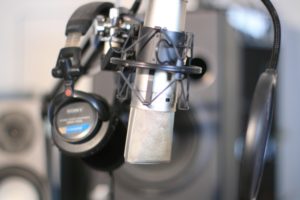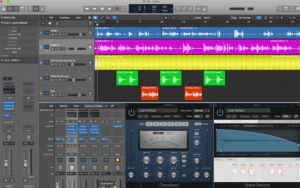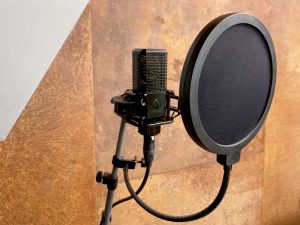Is a DIY Voice-Over Studio Worth It?
Voice-over is the process of recording an actor speaking over a piece of video in a film, documentary, or other media. Within the media industry, this is something which provides many jobs for voice actors in many different settings. In the modern age, especially since the pandemic, working from home has become a norm for some people, which may prompt many voice actors to consider the question: Is a DIY voice-over studio worth it?  There is no definite answer to this. There are many things to consider when deciding how and where to record a voice-over.
There is no definite answer to this. There are many things to consider when deciding how and where to record a voice-over.
Many beginners may opt for a DIY voice-over studio, believing that it is the cheapest and easiest. However, sometimes pushing the boat out and going to professionals may be a better option. It’s not as easy as ‘DIY will be the cheapest’, and sometimes it’s worth considering all options before making the decision. This blog post aims to outline the four main factors when deciding how and where to record your voice-over.
As with any project or job, there are many factors. The one which most people, especially beginners, may consider is budget. How much would a DIY voice-over studio cost as opposed to going professional? Another factor to consider is time. Is there a time limit to a specific project? How long are you willing to wait for a home studio? A third is space. Do you have the space in your home for a studio? And finally, experience. What experience do you already have with equipment and software, and what experience will you need to operate it? All of these things are vital to take into account.
Budget
Budget is something which needs to be considered for any project, no matter the scale. You may be intending to use your DIY home voice-over studio frequently, but certainty that it will bring you value for the money you spend on it is key.
A voice-over studio is more than just a microphone and a quiet room, although that may be how some beginners start out. A proper, working voice-over studio where professional jobs can be recorded needs much specialised equipment: the correct microphone, pop filters, de-essers, insulation, a good computer, storage… The list goes on. Although you may know what equipment is needed for your current job, the chances of different items being needed for the next one is high. Each brief has different requirements, and buying everything you will need for any project is not exactly budget friendly.
 For example, microphones alone have different purposes and are atvarying levels of ease of use. A USB microphone can connect straight to a computer to record, but doesn’t give professional-sounding quality. A dynamic broadcasting microphone provides a good quality, warm sound, but lacks detail in upper and mid frequencies, and requires an interface to record into a computer. A large diaphragm condenser microphone provides a detailed sound for all frequencies when used properly, but is more susceptible to catching unwanted sound, and again requires an interface to function.
For example, microphones alone have different purposes and are atvarying levels of ease of use. A USB microphone can connect straight to a computer to record, but doesn’t give professional-sounding quality. A dynamic broadcasting microphone provides a good quality, warm sound, but lacks detail in upper and mid frequencies, and requires an interface to record into a computer. A large diaphragm condenser microphone provides a detailed sound for all frequencies when used properly, but is more susceptible to catching unwanted sound, and again requires an interface to function.
It’s important to remember that the expense of purchasing such equipment may be counter-productive. A list of general equipment needed to record voice-overs from home can be found here.
To achieve a true, professional sound, professional equipment is generally recommended. It’s best not to skimp on things like shock mounts and insulation, which can come at a greater cost than the use of a DIY voice-over studio is worth. Furthermore, good software is vital when recording voice-overs, and that can be expensive and difficult to use. This may prompt a need to hire technicians, which adds to expenses.
A professional studio may seem pricey, but it would be fully equipped with the correct things needed to record a professional-sounding voice-over for any setting. It would also have talented technicians who would be very accustomed to using the technology and equipment. Therefore, if you are unsure that your budget will accommodate a home studio, a professional one would still be economically friendly in the short term.
Time
Working to a deadline? Perhaps building a DIY voice-over studio in your home may help you in the future, but it certainly won’t be quick to achieve. It’s important to remember that aside from waiting for equipment to arrive, setting it up, wiring it up and testing it, a significant amount of time would need to be put towards learning to operate the equipment and understand your chosen software.
 A dedicated worker would certainly be able to achieve this, but it may take some time. If you are working to a deadline on a job, hiring a studio with experienced technicians and fully functioning recording equipment may be the better option.
A dedicated worker would certainly be able to achieve this, but it may take some time. If you are working to a deadline on a job, hiring a studio with experienced technicians and fully functioning recording equipment may be the better option.
Space
Are you willing to give up a room in your house for a home voice-over studio? Home offices have become popular among the work-from-homers over the past couple of years, but losing a spare bedroom to a studio is a big decision. If you know you will use the studio often, perhaps this is a good idea. However, if your gigs come in waves or are few and far between, perhaps this isn’t such a good idea.
Some houses do not even have the space in the first place, and some are simply in noisy areas where it would be difficult to record properly. Furthermore, some people may wish to separate their work and home life, which would be difficult to do if the studio was inside your house. For these reasons, you may wish to consider using a professional studio near you, as it may end up being easier.
Experience
Experience is key to achieving professional quality in a voice-over. Even using a microphone correctly is something which can take practise, not to mention the hours of learning it can take to master the software. Do you already have this experience? If so, it would make operating in a home studio much simpler. If not, it may involve spending much more time learning, or much more money hiring out technicians on a freelance or permanent basis.
At a professional studio, you can be sure that the finished work will be edited and mixed correctly and recorded with the correct quality. The technicians are there to help get the best out of your vocal talent, and will be worth the money you pay for it. You can be sure of a good finished result by taking a look at their portfolio to see if they are right for the work you need to do.
Benefits of a DIY voice-over studio
Of course, there are benefits to having a home voice-over studio. If you are a vocal artist who has many jobs coming in regularly, the investment may prove beneficial and provide you with a comfortable working space which you can tailor to you needs. With patience, software can be mastered, or technicians can be hired, and if you are paid well enough for your work, you may find that a home studio has more benefits than downsides.
Home studios can be easier to access, without a need to pay for public transport or fuel, or spend time commuting to and from a studio elsewhere, and can also have benefits for disabled vocal artists who may find it easier to work from home. There are no open-close hours, meaning you can record whenever it takes your fancy, and potentially get more done, and you also have more time to practise and re-record without incurring costs. For these reasons, some may choose to invest in a home studio.
Conclusion
A voice-over studio setting is ultimately dependent on individual situation. If you have the money, time, space and experience to build one in your home, it could surely have benefits which would make your job easier for the remainder of the time you are doing it. In the long run, a DIY voice-over studio could be a great way to boost your career, as it may enable you to take on more jobs due to flexible working hours and less time spent commuting.
However, if you are less sure of your stream of work, have a smaller budget or don’t understand the software and hardware needed, a professional studio may be a better option. You can be sure that everything will be taken care of and that the project will be left in safe hands if you choose to use post-production services too.
Choosing whether to build a DIY voice-over studio can be a difficult choice, but with these four points, hopefully the decision has been made a easier, and with some mathematics and assessments of how much time, money and energy you are willing to spend putting into this project, an answer may be clearer.
Written by Remington Brown

Recent Comments